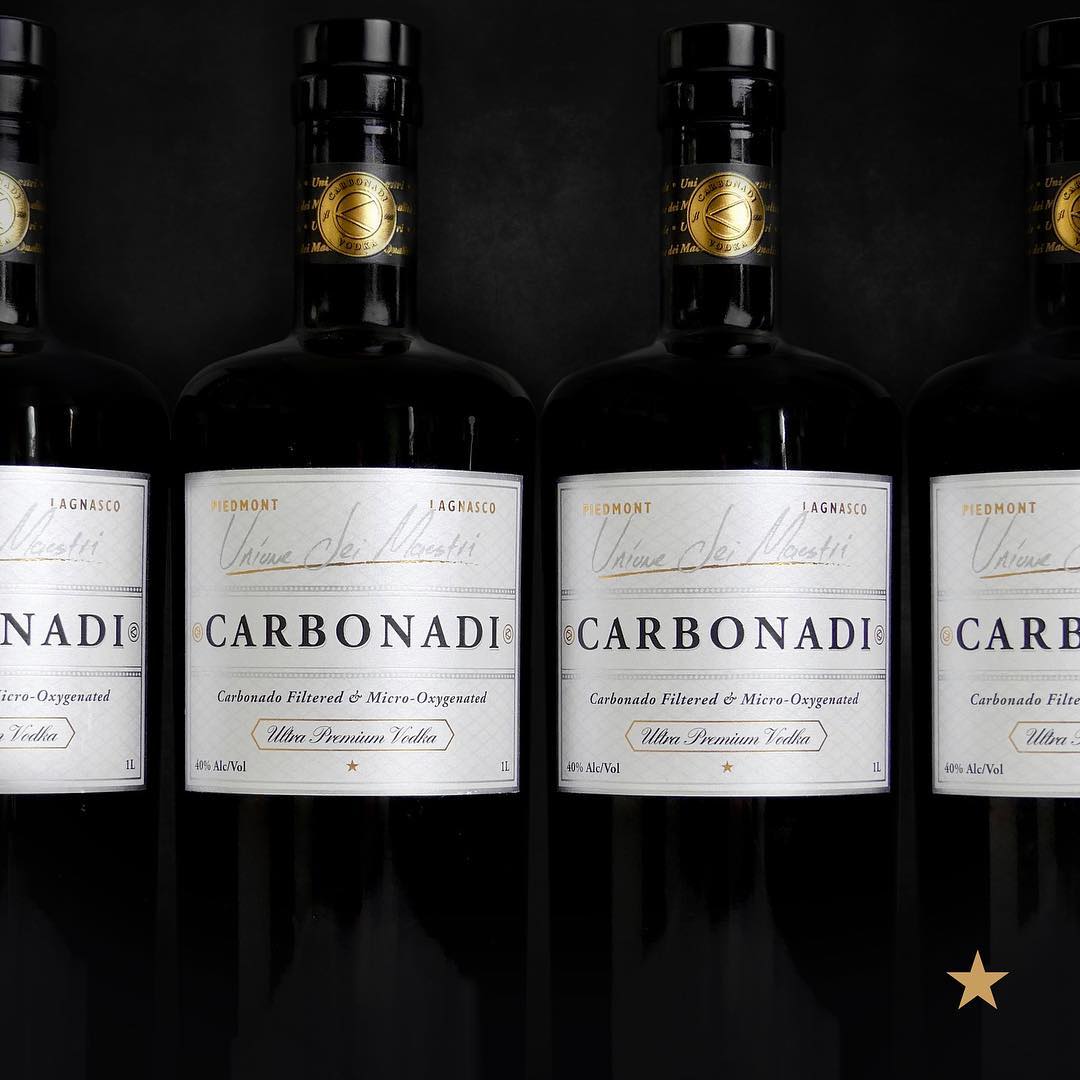Carbonadi isn’t your typical vodka brand. It doesn’t come in a plastic handle and you definitely don’t need to mix it with saccharine ingredients to mask its flavor. Born in the Piemonte region in northern Italy, this “ultra-premium vodka” is made from 100 percent organically grown winter wheat. It’s distilled five times before being filtered through black diamonds. Finally, it’s micro-oxygenated prior to bottling in an effort to give the spirit a velvety mouthfeel.
To say that it’s a complicated vodka is an understatement. This is vodka treated with the same care and attention to detail as the finest whiskies.
The brand was co-founded by Ricky Miller III, who saw a need to elevate the vodka category and, clearly, took that passion to the furthest degree. The name itself is a testament to the detailed production process. Carbonadi is the Italian plural for “carbonado” — the industrial-type black diamonds through which the vodka is filtered.
“It’s a spirit that’s very unique in a world of sameness,” Miller told Uproxx recently. “The texture is creamy, like that of a wine, the impurities are non-existent like the Alps water it’s married to, and the bottle has a very northern Italian luxury perfume aesthetic.”
A former professional athlete, Miller is also a cancer survivor and a Black man in an industry that has historically struggled with diversity. As the drinks business continues its a long-overdue reckoning with regards to racial justice and inclusion, the brand founder was gracious enough to answer a few questions about his struggles getting Carbonadi started, how the vodka world has embraced him, and the rewards of facing the unknown.
…
Why start a vodka brand?
Vodka makes up 1/3 of all spirits consumed. I wanted to elevate something that consumers were already drinking. I wasn’t interested in inventing a new category altogether.
Tell me about your phrase, “Being comfortable, being uncomfortable.”
This concept has propelled me through the toughest of times. I think playing football, to a point, had a lot to do with that because as an athlete in a collision sport like football you’re never 100% — there is always some type of ailment like a sprained ankle or knee, bruised elbow, massive headache, the list goes on and on and you’re expected to perform in the midst of all these issues. So you either perform or move out of the way so the next guy can get the job done.
When I was diagnosed with stage 3 small intestinal cancer in 2016, this concept is what got me through the storm. The chemo was brutal, my body took a real beating, but when you think about it simply the chemo is just the cost of survival. That made it easy for me. Suffer now, enjoy the win later. That is how I approach my business daily, the struggles and obstacles are just the cost to get Carbonadi where I believe it belongs — a globally respected luxury brand.
What are some of the struggles of being one of the only minority-owned vodka brands?
I think everything has to do with perspective. I don’t look at it as a struggle, I look at it as an opportunity to shine bright. I strongly believe in meritocracy, so to have the opportunity to shine and show the world that a Black man has the ability to create a luxury brand that has all the nuances of traditional luxury. A brand that carries the weight of a Dom Perignon, Chanel, or Fendi is a blessing, now I have to execute.

How has the vodka world embraced you?
The vodka world has embraced Carbonadi nicely, actually. From a consumer standpoint, they love the idea of being able to drink a vodka by itself — free of any mixers — and actually enjoy the experience. From a trade personnel perspective, they have also shown us love, thanks to the great feedback they receive from their patrons.
What difficulties have you found being a Black man in the vodka world?
I believe the difficulties I face are very common among other spirit entrepreneurs, of all races. As for things I face specifically as a Black entrepreneur, there may be some prejudice that takes place but because I’m so focused and locked in on the finish line, it doesn’t bother me — I don’t have the time to convince someone to act differently.
I definitely sniff out racism sometimes, but I’m so anti-entitlement I just move on to the next situation rather than whine and complain about how some idiot should not be racist.
How do you hope to inspire other aspiring Black Indigenous and People of Color (BIPOC) entrepreneurs?
The best way I can inspire other minority beverage owners is by winning and winning big in an unapologetic way. As minorities, we sometimes feel like we have to tiptoe around in a world where we aren’t highly represented. You cannot win big that way. So I wake up every day ready to execute in a way that will get Carbonadi that much closer to being a globally respected luxury brand, further reminding minorities we can do this too, at a very high level.
What advice do you have for BIPOC hoping to follow in your footsteps?
My advice would be to not follow my footsteps, but rather, learn from my experience — take little bit of this and a little bit of that and create your own path. You have to have a real passion for what you’re doing because you will be met with obstacles of all kinds and your passion, determination, and sheer will to win will be what gets you through.
Stay in student mode, constantly be learning by listening more than you talk. And finally, you have to be obsessed. You have to want to win more than you want to do anything else. For better or worse, your success will be commensurate with how much shit you’re willing to eat.







